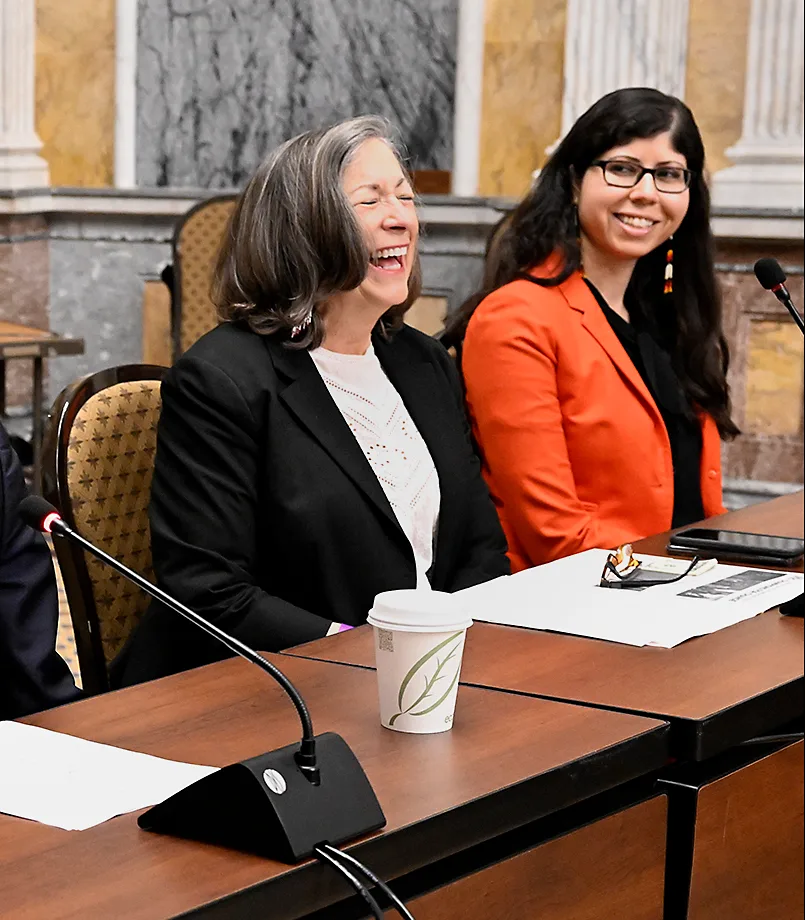The billboard project is expanding to Oregon
‘A steady, consistent voice within Treasury’
Pauly Denetclaw
ICT

Fatima Abbas, Haliwa Saponi, Josh Jackson, Cherokee, Treasury Secretary Janet Yellen, and U.S. Treasurer Chief Lynn Malerba, Mohegan Tribe, during the swearing-in ceremony of Malerba last year. (Photo courtesy of the U.S. Treasury)
An Indigenous woman will lead the US Department of Treasury’s Office of Tribal and Native Affairs
An Indigenous woman will become the first director of the Office of Tribal and Native Affairs at the U.S. Treasury. The tribal affairs office is first of its kind for the department and a permanent fixture.
Fatima Abbas, Haliwa Saponi, who was previously interim director of the office, will take over as the permanent director. The office will work closely with Indigenous nations to address specific needs identified by tribal leaders and to work with the Treasury Tribal Advisory Committee, a seven-member group that advises Treasury Secretary Janet Yellen on “taxation of Indians, the training of Internal Revenue Service field agents, and the provisions of training and technical assistance to Native American financial officers,” according to the Treasury.
“She can pave the way and set the stage for all of the good things that will happen within Treasury and that’s what’s going to be so important,” Chief Lynn Malerba, U.S. Treasurer, said to ICT. “She is standing up this office. She has the ability to create a vision for this office that will endure long after the two of us are gone.”

The office was initially established in 2022 after Malerba, Mohegan Tribe, was sworn-in. The seeds of this office were first planted in 2021 with the establishment of a tribal team under the Office of Recovery Programs. The team was created to address the needs of Indigenous nations who were recovering from the pandemic.
“(Abbas) was instrumental in helping deploy the unprecedented dollars that we saw go to Indian Country through the American Recovery Plan Act, and through the CARES Act,” Malerba said to ICT. “She was instrumental in helping Treasury understand how to deploy the funds, how tribes can report on those funds, and what the uses could be for those funds to ensure that tribes are able to access them, and to provide care through their communities during the pandemic.”
Before becoming director, Abbas worked on the tribal team to implement the $22 billion in relief and recovery funding given to Indigenous nations in 2021 through landmark bills. Previously, she worked for the National Congress of American Indians as the vice president of government relations where she led a team of seven who worked on issues around economic development and taxation.
Abbas is an attorney and is licensed to practice in California, Arizona, Pennsylvania and New Jersey. She graduated from the Berkeley’s School of Law at the University of California. She has worked for the Karuk Tribe in northern California and the Colorado River Indian Tribes in southeastern Arizona.
The creation and establishment of this office at the Treasury is important because it will endure long-past the political appointee’s leadership.
“The fact that she is a career employee at Treasury means that there will be a steady, consistent voice within Treasury that will help every political appointee understand what it means to fulfill that trust and treaty obligation to tribal nations,” Malerba said. “That is what is so important, because I’m a political appointee, so I won’t be here forever. But Fatima and her team will be career employees. That makes a big difference in terms of the consistency, the stability and the longevity of these policies enduring.”
This office will be the permanent hub for tribal policies in the U.S. Department of the Treasury that will continue to work with the Treasury Tribal Advisory Committee and foster consultation with sovereign Indigenous nations. The office will also be working with Congress to ensure they understand how the Treasury is implementing the legislation they pass.
“Fatima has been a real groundbreaker here already,” Malerba said. “I look forward to how she will use her role to be a strong leader within Treasury and to engage all of the departments in Treasury that work with tribes.”
External
Identification not yet made
UTTC International Powwow attendees share their rules for a fun and considerate event
Radio collaboration highlights importance of cooperation in a season of funding cuts for local media
A memorial in the Snow County Prison, now the United Tribes Technical College campus
Standing Rock Sioux Tribal Chairwoman Janet Alkire tells crowd, ‘We’re going to rely on each other’






